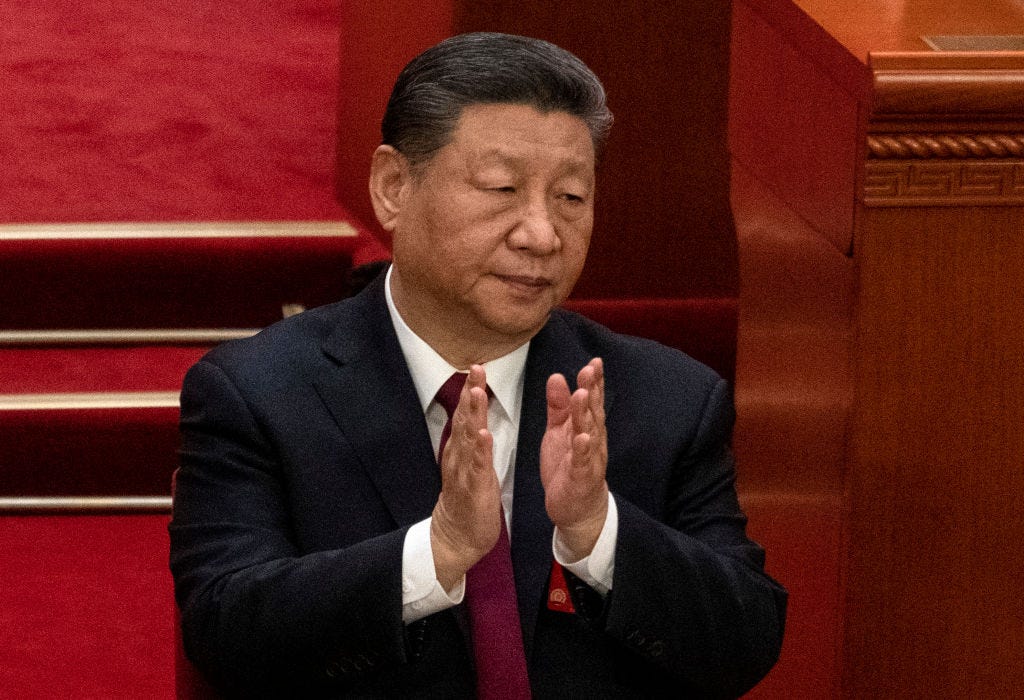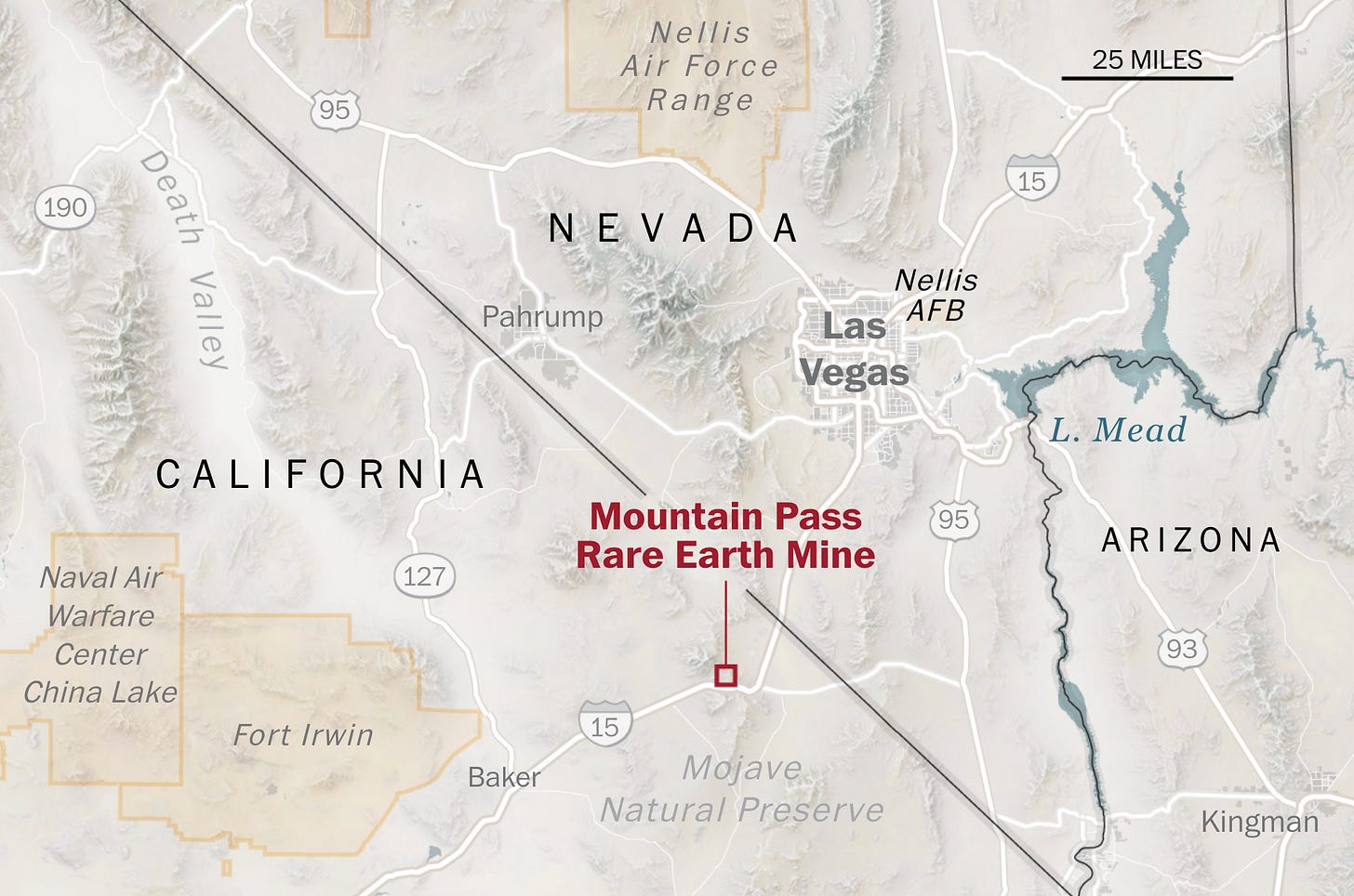How It’s Done
The US finally gets serious about rare earth metals.
“It is never too late to be what you might have been.” – George Eliot
Nearly two years ago, we coined the term Geopollutical Warfare™, an expression meant to describe the synergy between China’s geopolitical ambitions and its willingness to degrade its local environment in pursuit of them. When China lacks a dominant share of a strategically important resource, it identifies the earliest stage in the value chain that can be monopolized through financial brute force and arms its national champions with the flexibility to ignore environmental concerns. We lamented that Western leaders stood idly by while core industries were gutted by Chinese competition:
“Producers who set up shop in jurisdictions with lax pollution enforcement enjoy substantial advantages, while those in regions with strong controls grow necessarily less competitive over time. Of course, pollution limits—and how strictly they are enforced—are nothing more than policy choices. Taken to the extreme, allowing domestic producers to recklessly pollute amounts to a hidden but decisive subsidy that can allow a nation to monopolize strategic industries. No country has perfected this art more than China, as the world discovered yet again earlier this week…
The first step to solving any problem is admitting you have one. The US, by way of example, is overdue for a straightforward admission: it is in an economic war with China, a country that monopolizes a staggering number of the important materials the US needs and engages in unfair practices that undermine national security in the process.”
Among the critical minerals China has successfully cornered are the rare earth metals, and the primary means by which it achieved near-total dominance was by capturing the step at which the mined material—a concentrated mix of many valuable metals—is purified into individual components suitable for use in various military and industrial applications. Copious amounts of waste are produced along that processing journey, and treating such waste to Western standards became economically unfeasible at the market prices that prevailed after China entered the field. Last week, The New York Times caught on to how the game is played:
“Chinese mines and refineries produce most of the world’s rare earth metals and practically all of a few crucial kinds of rare earths. This has given China’s government near complete control over a critical choke point in global trade. But for decades in northern China, toxic sludge from rare earth processing has been dumped into a four-square-mile artificial lake. In south-central China, rare earth mines have poisoned dozens of once-green valleys and left hillsides stripped to barren red clay.
Achieving dominance in rare earths came with a heavy cost for China, which largely tolerated severe environmental damage for many years. The industrialized world, by contrast, had tighter regulations and stopped accepting even limited environmental harm from the industry as far back as the 1990s, when rare earth mines and processing centers closed elsewhere.”
It is difficult to compete on price when your competitor’s idea of a water treatment plant is a pipeline to the river.
As odd as it was for Western leaders to allow China to seize controlling shares of must-have materials, it is downright bizarre for them to assume the Chinese Communist Party wouldn’t use such leverage in any skirmish. Until recently, the Trump administration apparently didn’t think it would either:
“China’s skilful deployment of rare earth sanctions this spring was probably the key factor in forcing Washington to reverse its tariff rises on the country. They represent a new era of Chinese economic statecraft—evidence of a sanctions policy capable of pressuring not only small neighbours but also the world’s largest economy…
The new controls on exporting rare earth materials and magnets are different. In just a handful of weeks they threatened to shutter key factories across the auto industry—the largest manufacturing sector in most advanced economies. They also brought the US president to heel on his signature initiative: the trade war. The White House thought it had achieved escalation dominance. Its theory was that sky-high tariffs would be so costly that Beijing would have no hope but to negotiate. In fact, China’s leaders could swallow the political cost of tariffs. But Washington couldn’t ignore the loss of rare earth materials and its impact on auto companies.”
With free markets clearly failing to price environmental and national security concerns—let alone the convergence of both—a completely new approach was needed to address the rare earth vulnerability. Last week brought the announcement of just such a move:
“The Defense Department will become the largest shareholder in rare-earth mining company MP Materials by buying $400 million of its stock and helping it build a new processing facility to sidestep the Chinese market, the company said Thursday. The deal underscores how far the Trump administration is willing to go to subsidize production of high-powered magnets, a field dominated by Chinese firms although the materials are critical for U.S. weapons systems.
Las Vegas-based MP Materials owns the only rare-earth mine in the United States, at Mountain Pass, California, near the Nevada border. MP Materials CEO Jim Litinsky said the company aims to restore the full rare-earth supply chain in the U.S. and eliminate a ‘single point of failure’ in the country’s military-industrial base.”
Perusing the company’s press release and other corporate filings, the details of the creative deal become clear. The Pentagon is taking a holistic approach to the objective, investing the capital needed for MP Materials to construct domestic processing and magnetic facilities while also putting a floor price under the company’s products that accounts for the cost of proper environmental stewardship:
“DoD has entered into a 10-year agreement establishing a price floor commitment of $110 per kilogram for MP Materials’ NdPr products stockpiled or sold, reducing vulnerability to non-market forces and ensuring stable and predictable cash flow with shared upside.
For a period of 10 years following the construction of the 10X Facility, DoD has agreed to ensure that 100% of the magnets produced at the 10X Facility will be purchased by defense and commercial customers with shared upside.
The Company has obtained a commitment letter from JPMorgan Chase Funding Inc. and Goldman Sachs Bank USA to provide $1.0 billion of financing for the costs of constructing and developing the 10X Facility, subject to customary terms and conditions set forth therein. In addition, within 30 days, the Company expects to receive the proceeds of a $150 million loan from DoD in connection with its plan to expand its heavy rare earth separation capabilities at Mountain Pass.”
From a taxpayer perspective, the Pentagon’s investment protects its interests as well. The capital injection comes in the form of newly created preferred stock, convertible into common shares at a price of just over $30 per share. Additionally, the company granted the government further warrants with the same strike price. If the preferred shares are fully converted and the warrants fully exercised, the government would own 15% of the company. Given how dramatically the stock moved higher on the news, two things are apparent: the market firmly approved of the transaction, and the government is already deeply in the money on its investment. Quite the win-win.
To highlight the need for direct intervention, it’s important to recognize that the Pentagon is replacing Shenghe Resources as MP Materials’ largest shareholder and customer. At the end of 2024, the Chinese firm accounted for 80% of the American miner’s revenue. This transaction marks an important first step toward permanently reducing China’s leverage.
Amazingly, some investors and market analysts have criticized the deal, claiming it amounts to a proactive bailout or nationalization of MP Materials. In our view, such chatter is little more than the disgruntled laments of ill-informed short sellers. We first explained the weakness of the short case against the company in “Not a Rare to Spare,” published back in February of 2022. As Zerohedge pointed out on social media just a month ago, more than 20% of the company’s float was short—positioning that left many investors offsides as the shares rocketed on the news.
We close by noting that this is almost certainly the first of many similar deals to come in the months ahead. Investors would be wise to focus their research on identifying domestic alternatives to the many procurement vulnerabilities facing the Pentagon. Whatever one’s views of President Trump or his administration, it is undeniable that he and many of his top lieutenants bring significant business experience and have likely competed directly against China’s unfair practices. The MP Materials deal sends a strong signal that business as usual is over.
When it comes to products with direct national security implications, it was never a free market to begin with. At least now, it’s a fairer one.
“♡ Liking” this piece need not be rare.








A government with actual brainpower. Trump has just declared war on Low IQ congressional representatives. Well written piece. I think the Covid experience woke us up and exposed our vulnerability to critical products. Cheap stuff comes at a hidden price.
Indeed, this finely written article contains a number of educational aphorisms
1) A strike into the heart of the global elitists. Another Chinese “victory” achieved through environmental exploitation of the classic “tragedy of the commons”. The utilization of “state of the art” environmental standards are an opportunity to restore American mining/manufacturing to a hollowed out base MAGA!
2)The “Rare earths” are really not all that rare. Ask Montana, Greenland, or Canada.
Competing against the “externalization” of economic cost simply destroyed the competitiveness of Western firms in the global marketplace.
3)Economic reality may finally be “Trumping” narrative to the chagrin of the American left. They were willing to ignore three new coal plants/week in China and demonized an existing vital American plant. They favored the green new scam-because they chose to not visually see the exploitation of child labor, and the exorbitant environmental costs of mining or the other ruinous environmental elements associated with construction, operation, and disposal.
They lavished ruinous taxpayer subsidies on their construction and operation to subsidize fellow leftist elitists- all in the name of their church of carbon.
Out was only a matter of time until physics and simple economics reasserted their dominance over narrative.
Doomie’s line for the ages (paraphrased) - when your water treatment plan’s only cost is a pipe to the river- it confers a significant cost advantage to the producer.
A truer pro environmentalist statement was never spoken.